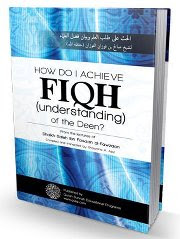 And from his character in seeking knowledge is that he seeks it whilst being in the state of neglect and forgetfulness. He only seeks the knowledge which his desire calls him towards.
And from his character in seeking knowledge is that he seeks it whilst being in the state of neglect and forgetfulness. He only seeks the knowledge which his desire calls him towards.And if it’s said, ‘How is that possible?’
The reply is, his aim in seeking knowledge is not due to him thinking it is fardh upon him or in order for him to worship Allah by fulfilling His obligations and staying away from the things He has declared unlawful, No! Rather his aim is to become known to the people as a taalib-ul-’ilm (student of knowledge) and so that the students flock around him.
He studies only for Riyaa (showing off) and debates with others in order to be known for his knowledge and eloquence in discussion. If the person he is debating with has the truth with him, it causes him grief. Even if he knows he is wrong he carries on debating and never declares he is mistaken due to fear of people criticizing his mistakes.
He is lenient with giving fatwa to those he loves and is severe and stern against those who can not benefit him at all. Whoever he teaches knowledge to he expects benefits back from. And if his students can not benefit him in this world but only benefit him in the aakhirah, teaching them becomes a burden upon him (and he sees it as a waste of time).
He anticipates the reward for knowledge he never practiced, and is not afraid of the consequences for knowledge he never acted upon. He speaks words of wisdom so it might seem he is from its people, whilst not fearing the evidence being established against him, because he doesn’t practice what he preaches. The more he learns and seeks knowledge the more he shows off and boasts.
If the scholars of his time are many in number and they are mentioned as people of knowledge he wishes to be mentioned with them. If they, the scholars, are asked about a question and he is not asked he wishes he be asked as well, when it was upon him to praise Allah who just saved him from being asked when others had fulfilled the need.
If it reaches him that any of the scholars made a mistake whilst he got the right verdict, he becomes happy for the mistakes of others, when in reality he should be sad for the mistakes of his brothers. If any of the scholars pass away it makes him happy since now people will be in need of him and his knowledge more.
And if he is asked about a matter that he has no knowledge of, it becomes difficult for him to say ‘I do not know’. If he hears about someone else that is benefiting the people more than he is, he hates him and does not tell the people about him. His pride stops him from admitting his own mistakes, even when corrected by others he will keep on defending his mistake, despite knowing it is a blatant mistake, just so that he might not be looked down upon by the people.
His fitnah (trial) is love for this dunya and being praised by mankind along with status and nobility. He beautifies himself with knowledge as people in this dunya beautify themselves with jewelry but he forgets to beautify his knowledge with actions.
(Taken from Akhlaaq al-Ulamaa by al-Aajoriyy)



